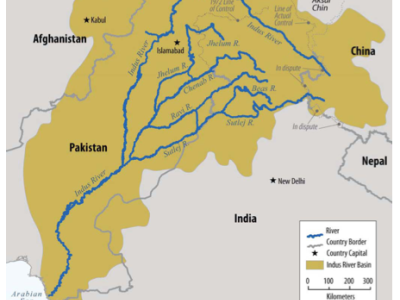…For Fighting Over
Nuclear-Armed India Announces Water Cut-Off To Nuclear-Armed Pakistan
Union minister Nitin Gadkari in a tweet has confirmed that India would ‘choke’ the water supply to Pakistan in light of the Pulwama attack. The move comes in the backdrop of the February 14 attack on CRPF convoy in Pulwama in Jammu and Kashmir, which resulted in the death of 40 CRPF personnel.
India will divert water from eastern rivers and supply it to the people of Jammu & Kashmir and Punjab, read Gadkari’s tweet. Under the Indus Waters Treaty, India shares the waters of the Beas and Sutlej rivers with Pakistan.
Now, this isn’t illegal: as the article points out, under the Indus Waters Treaty. a water-distribution treaty between India and Pakistan, control over the water flowing in three “eastern” rivers of India – the Beas, the Ravi and the Sutlej with the mean flow of 33 million acre-feet (MAF) – was given to India. (See map0.
But this is in retaliation for the horrific terrorist attack last week in Pulwama, which killed 40 people and which was backed by jihadi militants given protection in Pakistan. It is a significant move, although it is hard to blame New Delhi on this: Islamabad has been giving aid and comfort to these jihadis for too long, and with impunity.
I am currently reading This Unquiet Land: Stories From India’s Fault Lines, by prominent Indian television journalist Bharka Dutt. Dutt details the intense and high-stakes diplomacy that Bill Clinton and National Security Advisor engaged in during 1999’s Kargil War. That nearly melted down into a nuclear conflict. Dutt wonders in the book how the powers will handle this the next time: “and there WILL be a next time.” It is here.
“Whiskey is for drinking; water is for fighting over,” goes the old line. Here, water isn’t the goal: it is the weapon. And we will see more of this around the world in the coming years, as climate change puts severe pressure on already-burdened freshwater supplies, and nations will not be able to resist the temptation to use their access as leverage. If, of course, we make it that far.
Reader Comments
One Reply to “…For Fighting Over”
Comments are closed.




 Uh-Oh
Uh-Oh

Here’s another old line: “War, what is it good for? Absolutely nothing.”
Less than 1% of the Earth’s water supply is freshwater in the form of lakes, rivers, streams, groundwater, etc. About 2% is frozen in glaciers and the polar ice caps. 97% of the planet’s water is in the oceans.
Rather than kill each other over mere fractions of the less than 1% of currently existing freshwater, a better alternative is to increase the supply of freshwater through desalination and other methods. Over 40% of the world’s population lives within 100 km of a coastline, and that number is expected to grow rapidly in the coming decades. Pakistan itself is projected to have a tenfold increase in its low elevation coastal zone population by 2060.
Are there environmental concerns? Of course. But rather than reject such technologies outright, and do greater harm by diverting scarce water resources away from environmental purposes (not to mention killing each other), environmental solutions should be developed — such as dispersed beach well filtration, harvesting salt from brine discharge and solar power or power plant co-location for energy. Desalination on a global scale will also help mitigate sea level rise by redistributing increased ocean water onto land for beneficial purposes.
Are there cost concerns? Of course. Existing desalination plants generally increase the cost of product water by about 1 cent/gallon. That cost is astronomically less than the toll on human life and the environment resulting from inadequate supply of freshwater, and should decrease as technologies advance and infrastructure scales up. It is also ridiculously less than the amount that people pay for bottled water, which is projected to exceed $200 billion globally by 2025. Today, a 12 oz bottle of water typically costs about $1, which is equivalent to $10.00/gallon.
Let’s make water, not war.